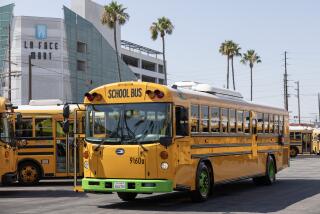Brown Pessimistic on Bill Requiring Bilingual Classes
- Share via
SACRAMENTO — Assembly Speaker Willie Brown all but conceded Tuesday that bilingual education programs required of school districts statewide will expire June 30 because of Assembly Republicans’ continued opposition to legislation that would keep the programs alive.
But the San Francisco Democrat, speaking confidently about the future of bilingual education, said he expects most school districts to keep their curriculum intact while Democrats move toward passage of a bill that would reinstate the programs next January.
Speaking to reporters at a Capitol press conference, Brown asserted that most school districts “have been supportive of the bilingual programs” and “will continue the programs that exist” in the expectation that a Democratic-sponsored bill will take effect.
But the Speaker, who is a vocal advocate of bilingual education, cautioned that if Republican Gov. George Deukmejian vetoes the Democratic-sponsored bill, as he did last year, many districts could permanently abandon bilingual education, directing the money to other priorities.
“This will reduce the opportunity of people to get quality education in the state,” Brown charged.
The existing state law, which expires June 30, requires that whenever there are 10 students in a single grade who speak a common foreign language, the school provide instruction in that language. At the same time, the school must provide instruction for the students in English with the eventual aim of bringing them up to their grade level in English proficiency.
Currently, there are about 525,000 students enrolled in bilingual programs throughout California. In the Los Angeles Unified School District, the state’s largest, roughly 160,000 of the district’s 590,000 students participate in bilingual education.
Money Continues
A spokesman for the state office that oversees bilingual education said school districts will continue to receive state money for bilingual programs even if the requirements lapse. But the districts will gain broad latitude in how they could spend the money.
Los Angeles school officials have pledged to keep their programs going regardless of what happens. However, officials of other school districts said they will view the lapse of the bilingual requirements as an opportunity to change the program’s direction.
Last year, Deukmejian vetoed a bill by Brown that would have extended the bilingual requirements until 1992. The governor said he took the action because of demands by Assembly Republicans that the programs be overhauled rather than simply extended.
Many of those proposed modifications are contained in a bill introduced in January by Assemblyman Frank Hill (R-Whittier), which would keep bilingual education alive but only if local schools are given more discretion in how it is run. The bill also requires parents to give consent before their children could be enrolled in bilingual classes.
Brown, who strongly opposes those changes, predicted that Hill’s measure will be rejected in the Assembly and cautioned that “it would be ill-advised” for the Republican lawmaker to even request a vote on his legislation.
Two-Thirds Majority Doubted
The Speaker conceded, however, that his own bill, which would retain bilingual programs basically as they now exist, is not likely to gain the two-thirds majority needed to become law before the bilingual requirements expire.
Brown nonetheless expects to bring his measure to a vote on the Assembly floor as early as Thursday. And he predicted that Democrats, who control both houses of the Legislature, will pass it with a simple majority. But without the two-thirds vote, which would designate it as an “urgency” measure, the bill could not take effect until Jan. 1, allowing a six-month lapse in the programs.
A spokesman for Deukmejian strongly hinted that the governor will veto any bill sent to him without the “bilingual reforms” demanded by Republicans. “The governor supports bilingual education, but he does not support this particular bill in its present form,” said Kevin Brett, the governor’s deputy press secretary.
In Los Angeles, district spokesman Bill Rivera said the major benefit schools would derive from the lifting of the state bilingual restrictions would be greater flexibility to expand an innovative program known as the Eastman project. It separates children of limited English proficiency from those who are fluent in English for part of the day and, officials say, has been more successful than traditional bilingual programs in raising the academic achievement of bilingual students.
However, in the Santa Ana Unified School District, which serves a growing population of Asian and Latino immigrant students, Trustee Mary Pryer said “the chances are good” that the board would examine other methods, such as English immersion, that would not require a fully credentialed bilingual teacher in every bilingual classroom.
Leo C. Wolinsky reported from Sacramento and Elaine Woo from Los Angeles.
More to Read
Get the L.A. Times Politics newsletter
Deeply reported insights into legislation, politics and policy from Sacramento, Washington and beyond. In your inbox three times per week.
You may occasionally receive promotional content from the Los Angeles Times.











